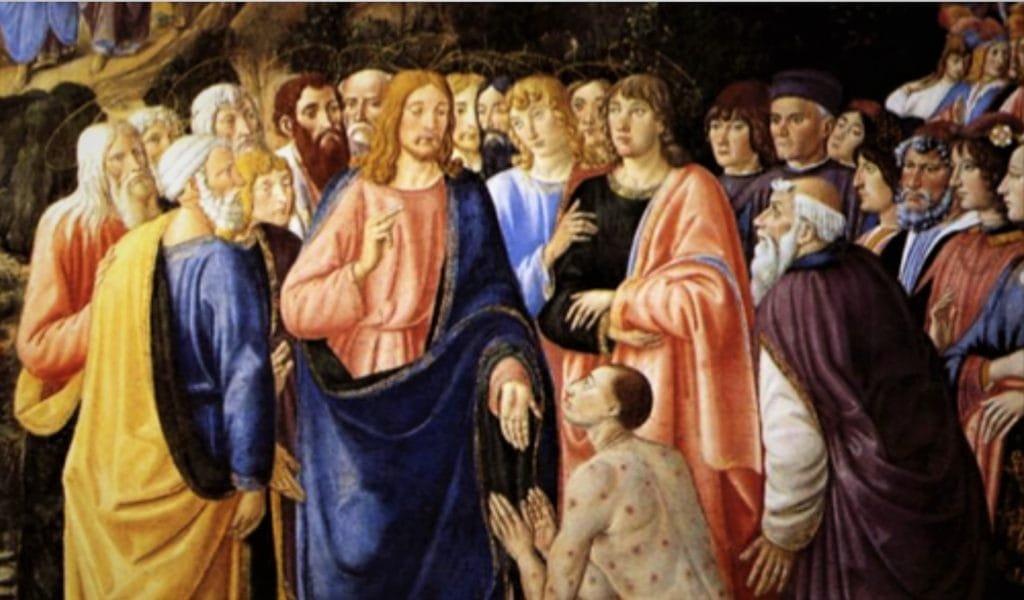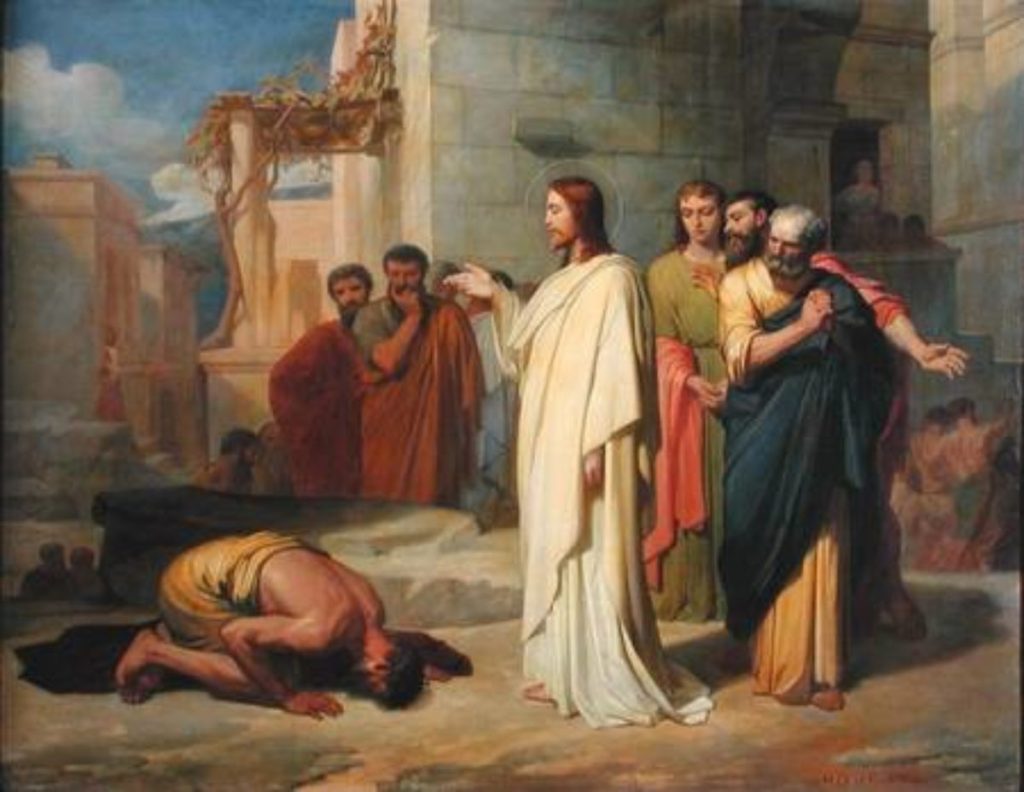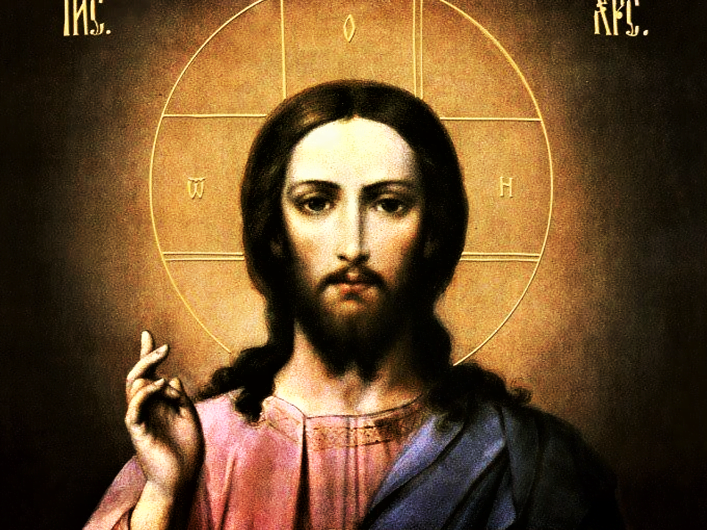POPE BENEDICT XVI ON THE 6TH SUNDAY IN ORDINARY TIME YEAR B

ANGELUS ADDRESS
12 February 2012
Dear Brothers and Sisters,
Last Sunday we saw that in his public life Jesus healed many sick people, revealing that God wants life for human beings, life in its fullness. This Sunday’s Gospel (Mk 1:40-45) [6th Sunday in Ordinary Time Year B] shows us Jesus in touch with a form of disease then considered the most serious, so serious as to make the person infected with it “unclean” and to exclude that person from social relations: we are speaking of leprosy. Special legislation (cf. Lev 13-14) allocated to priests the task of declaring a person to be “leprous”, that is, unclean; and it was likewise the priest’s task to note the person’s recovery and to readmit him or her, when restored to health, to normal life.
While Jesus was going about the villages of Galilee preaching, a leper came up and besought him: “If you will, you can make me clean”. Jesus did not shun contact with that man; on the contrary, impelled by deep participation in his condition, he stretched out his hand and touched the man — overcoming the legal prohibition — and said to him: “I will; be clean”.
That gesture and those words of Christ contain the whole history of salvation, they embody God’s will to heal us, to purify us from the illness that disfigures us and ruins our relationships. In that contact between Jesus’ hand and the leper, every barrier between God and human impurity, between the Sacred and its opposite, was pulled down. This was not of course in order to deny evil and its negative power, but to demonstrate that God’s love is stronger than all illness, even in its most contagious and horrible form. Jesus took upon himself our infirmities, he made himself “a leper” so that we might be cleansed.
A splendid existential comment on this Gospel is the well known experience of St Francis of Assisi, which he sums up at the beginning of his Testament: “This is how the Lord gave me, Brother Francis, the power to do penance. When I was in sin the sight of lepers was too bitter for me. And the Lord himself led me among them, and I pitied and helped them. And when I left them I discovered that what had seemed bitter to me was changed into sweetness in my soul and body. And shortly afterward I rose and left the world” (FF, 110).
In those lepers whom Francis met when he was still “in sin” — as he says — Jesus was present; and when Francis approached one of them, overcoming his own disgust, he embraced him, Jesus healed him from his “leprosy”, namely, from his pride, and converted him to love of God. This is Christ’s victory which is our profound healing and our resurrection to new life!
Dear friends, let us turn in prayer to the Virgin Mary, whom we celebrated yesterday commemorating her Apparitions in Lourdes. Our Lady gave St Bernadette an ever timely message: the invitation to prayer and penance. Through his Mother it is always Jesus who comes to meet us to set us free from every sickness of body and of soul. Let us allow ourselves to be touched and cleansed by him and to treat our brethren with compassion!
SOURCE: http://www.vatican.va/content/benedict-xvi/en/angelus/2012/documents/hf_ben-xvi_ang_20120212.html
EMPHASIS MINE.
ANGELUS ADDRESS
15 February 2009
Dear Brothers and Sisters,
During these Sundays the Evangelist Mark has offered for our reflection a sequence of various miraculous cures. Today he presents to us a very special one, the healing of a leper (Mk 1: 40-45) who approached Jesus and, kneeling down begs him: “If you wish, you can make me clean”. Jesus, moved with pity, stretched out his hand and touched him, and said to him: “I do will it. Be made clean!“. And the man was instantly healed. Jesus asked him to say nothing about the event but to present himself to the priests to offer the sacrifice prescribed by the Mosaic law. However, the leper who had been healed was not able to keep quiet about it and instead proclaimed what had happened to him to all so that the Evangelist recounts the sick flocked to Jesus in even greater numbers, to the extent of forcing him to remain outside the towns to avoid being besieged by people.
Jesus said to the leper: “Be made clean!“. According to the ancient Jewish law (cf. Lv 13-14), leprosy was not only considered a disease but also the most serious form of ritual “impurity”. It was the priests’ duty to diagnose it and to declare unclean the sick person who had to be isolated from the community and live outside the populated area until his eventual and well-certified recovery. Thus, leprosy constituted a kind of religious and civil death, and its healing a kind of resurrection. It is possible to see leprosy as a symbol of sin, which is the true impurity of heart that can distance us from God. It is not in fact the physical disease of leprosy that separates us from God as the ancient norms supposed but sin, spiritual and moral evil. This is why the Psalmist exclaims: “Blessed is he whose fault is taken away, / whose sin is covered”, and then says, addressing God: “I acknowledged my sin to you, / my guilt I covered not. / I said, “I confess my faults to the Lord’ / and you took away the guilt of my sin” (32[31]: 1, 5). The sins that we commit distance us from God and, if we do not humbly confess them, trusting in divine mercy, they will finally bring about the death of the soul. This miracle thus has a strong symbolic value. Jesus, as Isaiah had prophesied, is the Servant of the Lord who “has borne our griefs / and carried our sorrows” (Is 53: 4). In his Passion he will become as a leper, made impure by our sins, separated from God: he will do all this out of love, to obtain for us reconciliation, forgiveness and salvation. In the Sacrament of Penance, the Crucified and Risen Christ purifies us through his ministers with his infinite mercy, restores us to communion with the heavenly Father and with our brothers and makes us a gift of his love, his joy and his peace.
Dear brothers and sisters, let us invoke the Virgin Mary whom God preserved from every stain of sin so that she may help us to avoid sin and to have frequent recourse to the Sacrament of Confession, the sacrament of forgiveness, whose value and importance for our Christian life must be rediscovered today.
SOURCE: http://www.vatican.va/content/benedict-xvi/en/angelus/2009/documents/hf_ben-xvi_ang_20090215.html
EMPHASIS MINE.
SEE AS WELL: 6TH SUNDAY IN ORDINARY TIME YEAR B 2021 MASS PRAYERS AND READINGS HERE.
FOR THE REFLECTION HOMILY ON THE 5TH SUNDAY IN ORDINARY TIME YEAR B, CLICK HERE, AND HERE.
Stay updated: subscribe by email for free TO OUR NEW WEBSITE www.catholicsstrivingforholiness.org (PUT YOUR EMAIL IN THE SUBSCRIBE WIDGET).
We are also in www.fb.com/Catholicsstrivingforholiness. Kindly help more people in their Christian life by liking our page and inviting your family, friends and relatives to do so as well. Thanks in advance and God bless you and your loved ones! Fr. Rolly Arjonillo

